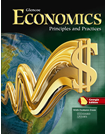"Learning About an Occupation"
Introduction
Students often think that they would like to go into a profession
long before they know very much about it. This activity will
give them the opportunity to take an in-depth look at one
of the higher-paying and more prestigious occupations available
today. Lesson Description
The site that students will visit in this activity is the
"economists" page of the Occupational Outlook Handbook
that is published by the Bureau of Labor Statistics.
As such, it is one of the most comprehensive and reliable
guides available today, and it is now on the World Wide Web
for even easier access. Previous Knowledge Expected
Students should be familiar with the following terms:
human capital: the sum of skills, abilities, health,
and motivation of people
trade-offs: the alternative choices that are available
whenever a decision is made
opportunity cost: the cost of the next best alternative
use of money, time, or resources when one choice is made rather
than another Applied Content Standards (from the Council for Economic Education)
Standard 13: Income for most people is determined by the
market value of the productive resources they sell. What workers
earn depends, primarily, on the market value of what they
produce and how productive they are. Instructional Objectives - Students will find detailed knowledge about a specific
occupation.
- Students will use a major occupational resource on the
World Wide Web.
Student Web Activity Answers
- Answers will vary, but could include collecting, analyzing,
interpreting, and presenting numerical data; monitoring economic
trends; and researching issues such as interest rates, imports,
energy costs, and employment levels.
- Answers will vary, but students could note that other areas
of study might include statistics, accounting, calculus, psychology,
computer science, English, and sociology. Economists are expected
to apply their knowledge of statistical methods to a particular
area of study, so they take additional courses to learn more
about these other areas. For many jobs, a master's degree
is required.
- Answers will vary, but students should note that economists
are employed in both the private and the public sector. Many opportunities
are in private industry such as research and consulting firms,
state and local governments, and the federal government. Many
economists work as teachers in colleges and universities,
others work in business and industry. Salary ranges vary.
See the listing under "Earnings."
- Answers will vary, but students should recognize that to
become an economist means that they will have to give up another
occupation. Some of the specific opportunity costs will also
be related to the additional training and study that will
be required to become an economist.
Extending the Lesson
Encourage students to research further information about one
of the "Related Occupations" links (mathematicians, research
analysts, statisticians, etc.) on the BLS Web site.
Tell students that they can find the home page for the most
recent BLS Occupational Outlook Handbook at http://www.bls.gov/oco/
where they can perform a simple keyword search to find out
more about other occupations.
|







